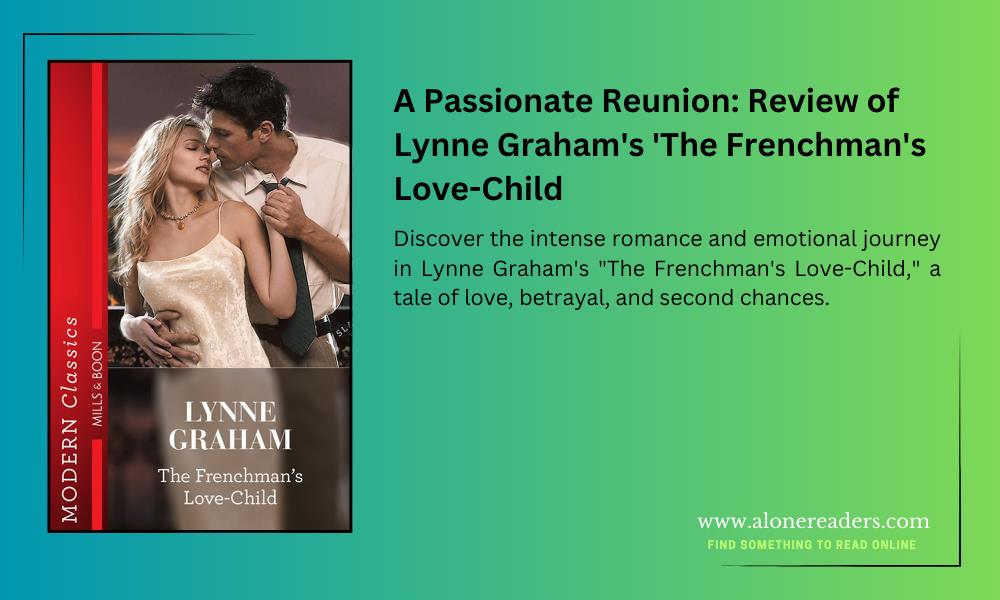
Lynne Graham's The Frenchman's Love-Child offers an enthralling narrative that blends passion, heartbreak, and redemption, leaving readers hooked from beginning to end. Known for her captivating storytelling and complex characters, Graham delivers a tale that takes readers on an emotional rollercoaster, filled with intense moments and heartfelt revelations. This novel is a quintessential example of why she remains a beloved figure in the world of romantic fiction.
The story centers on the relationship between Winnie, an independent and spirited woman, and Aristide, a powerful and enigmatic French businessman. Their connection is immediate and electric, but their love story is far from smooth. The narrative begins with a sense of mystery and intrigue, as Winnie’s life is turned upside down by Aristide’s sudden reappearance. Years earlier, their whirlwind romance ended abruptly, leaving Winnie to deal with the aftermath of their brief yet life-altering relationship.
Winnie’s resilience and strength are evident throughout the novel. Despite facing heartbreak and betrayal, she emerges as a character who fights for her happiness and protects what matters most to her. Aristide, on the other hand, is portrayed as a man torn between his feelings and his sense of control. His dominant personality and reluctance to fully open up create much of the tension that drives the narrative forward. Yet, beneath his hardened exterior, Aristide’s vulnerability and genuine affection for Winnie make him a complex and redeemable character.
The central conflict arises when Aristide discovers that he has a son with Winnie. This revelation sets the stage for a series of emotionally charged confrontations and tender moments as they navigate their unresolved feelings and attempt to build a future together. Graham masterfully captures the nuances of their interactions, from heated arguments to heartfelt confessions, making their journey toward reconciliation both believable and deeply moving.
One of the novel’s strengths is its exploration of trust and forgiveness. Winnie and Aristide’s relationship is marked by misunderstandings and miscommunications, but it is also a testament to the enduring power of love. The emotional stakes are high, and readers are drawn into their world, rooting for them to overcome their differences and find happiness. Graham’s ability to depict raw emotion with authenticity ensures that the story resonates with readers on a personal level.
The setting adds another layer of allure to the story. From the bustling streets of London to the picturesque landscapes of France, the vivid descriptions transport readers to a world of elegance and romance. These backdrops not only enhance the story’s charm but also reflect the characters’ emotional journeys. The contrast between the sophisticated, controlled world of Aristide and the more grounded, heartfelt existence of Winnie mirrors their internal struggles and ultimate growth.
While The Frenchman's Love-Child follows many of the conventions of the romance genre, Graham injects enough depth and complexity to set it apart. The plot moves at a brisk pace, ensuring that there are no dull moments, yet it also allows for introspection and character development. The secondary characters, though not as fleshed out as the leads, serve to highlight the main themes of love, family, and redemption.
Critics of the novel might point to some of its more predictable elements, as certain tropes are staples of the genre. However, Graham’s skill lies in her ability to breathe new life into these familiar narratives. Her characters are flawed yet relatable, and their journey feels both timeless and unique. Fans of the genre will find comfort in the story’s adherence to romantic conventions while appreciating the depth and intensity of the emotions portrayed.
In conclusion, The Frenchman's Love-Child is a testament to Lynne Graham’s prowess as a storyteller. It is a tale that captivates the heart and stirs the soul, offering readers a perfect blend of passion, drama, and hope. Winnie and Aristide’s journey is one of self-discovery and second chances, making it a compelling read for anyone who believes in the transformative power of love. Whether you are a longtime fan of Graham’s work or new to her novels, this book is sure to leave a lasting impression.